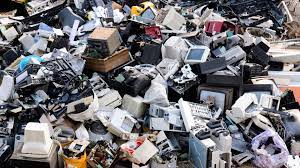‘E-waste hazardous to children and pregnant women’

World Health Organisation (WHO) has raised concern over the mismanagement of electronic waste saying it is a health hazard to children and pregnant women.
In a recent study titled, Children and digital dumpsites: e-waste exposure and child health, WHO noted that prenatal and childhood exposure to e-waste are significantly linked with serious health conditions hence the need to ensure its properly disposed of.
E-waste refers to the remains of technological materials once used in homes and industries such as laptops, mobile phones, television sets, coffee machines, fridges, old analogue radios and many other electrical gadgets, including plastic waste, generated by developed countries.
“The study reveals disturbing evidence of the hazardous impact of e-waste on the health of children and pregnant women. Prenatal and childhood e-waste exposure are significantly linked with impaired neurodevelopment and behaviour, particularly as a result of exposure to lead, mercury and other organic chemicals,” WHO noted.
“Poor e-waste management has resulted in negative birth outcomes, which have been associated with chemical exposure, including exposure to PAHs, lead, cadmium, nickel and chromium. This has negatively impacted on children’s health as it causes lung malfunction and respiratory effects, including cough, wheezing and asthma.”
WHO noted that there have also been reports of damaged DNA associated with exposure to lead, chromium, cadmium and nickel as well as increased risk of some chronic diseases later in life, including cancer and cardiovascular disease.
“The report further revealed that chemicals detected in e-waste recycling processes belong to the group of 10 chemicals named by WHO as of major public health concern. These include heavy metals such as lead, cadmium, and mercury; persistent organic pollutants such as dioxins; and fine particles (PM2.5) and other air pollutants emitted through e-waste combustion,” WHO said.
A Bulawayo-based human rights watchdog, Matabeleland Institute for Human Rights (MIHR), in a bid to address e-waste management in the country, petitioned the Parliament of Zimbabwe to enact a national e-waste policy to regulate the disposal, sorting, and recycling of e-waste in the country.
“The e-waste policy will also be integral in controlling the importation of electric and electronic equipment that is already in its end of shelf life or that is recycled,” MIHR stated.
“Enacting such a policy is a step by the government towards the progressive realisation of human rights as enshrined in the Constitution of Zimbabwe as committed by Vision 2030.”






